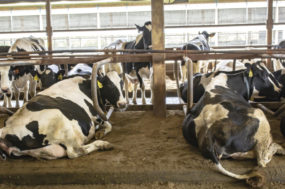One of the first steps of conservation planning is understanding the landowner’s goals and objectives. In fact, this step is so important that if we plan without it, the plan fails. I recently visited a dairy farm in northern Michigan. As part of my duties, I was tasked with evaluating the planning effort of an agronomist applying for a planning certificate. This story is not about the agronomist – but the farm family.
In terms of definition, a family farm is the collection of assets, cows, land, buildings and equipment that exist on the farm. The farm family, however, is quite different. A farm family is the people on the farm that make up one or more families. These include the owners, the employees and even the off-farm people that have an interest in the farm. The farm family includes the decision-makers.
On this particular dairy farm, the farm family included four families. The patriarch, a gentleman my age (I am 60 years old) and his wife are the parents of three young men. All of these men are married, and two have children.
All three sons left the farm, working in jobs very different than farming. The father pointed out to them that until they worked off the farm, they would not know whether the farm is where they wanted to be. I have seen this approach before, and in nearly all cases, it works. More often than not the sons come back home and ask to join the business.
This question assumes two things: One, the wife wants to live on a farm or at least nearby. Two, parents want their son to join the business. Of course, the financial aspects must be considered. Another family involved as part of the farm family usually requires expansion of the land base, the herd size or both.
During our walk around the farm site itself, one of the sons showed us the cow and heifer herd on the production area site, while another son showed us the crop fields. I learned that for this farm family, one son takes care of the dairy herd, another the farming operation and another manages the record-keeping and accounting of financial records.
They share some workload, but there is a clear line of responsibility. I asked about their father … he was preparing for a fishing trip to Canada.
Once our walkaround was completed – in about two hours – we gathered everyone in the milk house and talked about the future. The father rarely said a word. Instead, it was the three sons giving us their goals and objectives, with a fair bit of insight and agreement too.
In other words, this is a farm family that includes four families and several in-laws. They worked together, got along and had a plan for the future.
Over the years of writing this column, I have often returned to the theme of the farm family, especially the generational transfer. Many of them are messy and fail. But on this farm, the transfer was nearly complete; the father had a smile on his face and seemed very much at ease with his sons making the decisions.
I am not quite sure if we truly know the methodology for such effective transitions. With two generations working in a business, especially a dairy farm, just getting along can be challenging. And then we introduce the wives or in-laws into the business and our outcomes can be very challenging.
My guess is the transfer is based much more with the older generation. I certainly do not know this family very well, but the demeanor of the father was soft-spoken, not boisterous or egotistical. He seemed comfortable with himself and certainly not controlling.
For the three sons, they had gone somewhere else and worked for someone else. They needed to leave the farm in order to come back to it. There is some wisdom here, and the father and mother of these three sons have that wisdom.
We did not ask what happens or could happen if one or more of the sons did not come home. We gain nothing by searching for that answer. What we did ask is this: “Why did you decide to come home?” I got similar answers from each son.
One, they all reported that their father and mother said that if they want to come home, they can. The business (family farm) was then – and is today – sufficiently capitalized to support another family. Another way to write this is they were told the work must be done by family or employees will be hired to work.
Two, they all reported that they enjoyed the rural lifestyle and, importantly, so did their wives. Living on a farm in control of their own work and schedule was appealing to them.
Three, they all reported that given what they saw and experienced off the farm, there was little security in northern Michigan outside of production agriculture. The security includes business opportunities and careers in something other than production agriculture. But they did not really experience this until they went out into the world, reflected a bit on what they saw and realized the farm was a good place to bring meaning to their lives.
As I have written in this column numerous times, life does not have any meaning until we bring meaning to it. In order to make this discovery, we go into the world and take a different path or multiple paths, seeking an inner satisfaction and “place” in our lives.
Some people seek for their entire lives and live a life with multiple meanings. Others listen to their gurus and are told what is the meaning of their life. Here, though, we have three young men that went away from the farm and while on a different path, realized it was not a satisfying path, nor was it one that was meaningful.
My point is this: Sometimes we must try something else to know that it is not the path bringing meaning to our lives. Sometimes we must change our focus or thought – try a new career – so that we may know if we have found something that is meaningful, satisfying and peaceful.
I do not think this “something” can be told to us. I do not think that a sufficient number of gurus can tell us what is the meaning of our lives. I am suggesting that in order to bring this inner journey to some measure of meaning, we have to take that outer journey of discovery.
Humans are explorers and seekers. These three young men became explorers … leaving the farm and seeking something else but only to return home, one at a time. Yet they did so because they took that outer journey and now reconciled it with their inner journey.
The inner journey is one we all make, every day in fact, to reconcile what we do that others can see and experience. We find, I submit, that if the inner journey is meaningful, satisfying and peaceful, then we are on the path of a meaningful life.
I am not saying there is only bliss and no sacrifice. Indeed, sometimes the meaningful life is full of sacrifice. Otherwise humans would not be explorers and seekers, willing to take a risk and go down an unfamiliar path.
I admire this farm family very much. I know that for every one of them there are others, maybe lots of others, that have a very different outcome. My guess is the father, while fishing in Canada, is not at all concerned with the family farm business. He knows the farm family is in place and working well.
A lesson for all of us. PD

Mike Gangwer
Agricultural Scientist
USDA-NRCS





